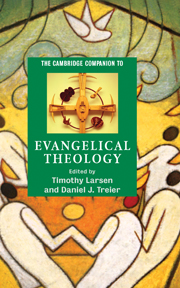Book contents
- Frontmatter
- 1 Defining and locating evangelicalism
- Part I: Evangelicals and Christian doctrine
- 2 The triune God of the gospel
- 3 Scripture and hermeneutics
- 4 Jesus Christ
- 5 The human person in the Christian story
- 6 Justification and atonement
- 7 The Holy Spirit
- 8 Conversion and sanctification
- 9 The church in evangelical theology and practice
- Part II: The contexts of evangelical theology
- Index
7 - The Holy Spirit
from Part I: - Evangelicals and Christian doctrine
Published online by Cambridge University Press: 28 September 2007
- Frontmatter
- 1 Defining and locating evangelicalism
- Part I: Evangelicals and Christian doctrine
- 2 The triune God of the gospel
- 3 Scripture and hermeneutics
- 4 Jesus Christ
- 5 The human person in the Christian story
- 6 Justification and atonement
- 7 The Holy Spirit
- 8 Conversion and sanctification
- 9 The church in evangelical theology and practice
- Part II: The contexts of evangelical theology
- Index
Summary
INTRODUCTION
The bane and bog of most evangelical theology for the last century has been the doctrine of the Holy Spirit. Within the evangelical movement it has either bogged down in the sinking quagmire of debate or hovered emptily in the stale air of banality. To be sure, part of this dilemma is shared by all Christian theology in the West, namely, that the Spirit has been portrayed in Scripture without a face or with non-personal characteristics (such as a dove, wind, fire). The result is that theological consideration of the third article of the creed lacks depth and nuance. In some ways, this is fitting since the Holy Spirit points to Jesus Christ (John 15:26) and “will not speak on his own” but only what he hears (John 16:13; TNIV). The Spirit will glorify Christ because it is from Christ that the Spirit receives whatever he makes known to the disciples (John 16:14). Hence, one prominent scriptural image that we receive concerning the Holy Spirit is this manner of deflecting glory and attention to Jesus the Christ. Such a deferential move may be one reason why Christian theology has added very little to the Nicene-Constantinopolitan Creed (AD 381): “And [we believe] in the Holy Spirit, the Lord and life-giver, Who proceeds from the Father and Son, Who is worshipped and glorified together with the Father and Son, Who spoke through the prophets.”
- Type
- Chapter
- Information
- The Cambridge Companion to Evangelical Theology , pp. 93 - 108Publisher: Cambridge University PressPrint publication year: 2007

